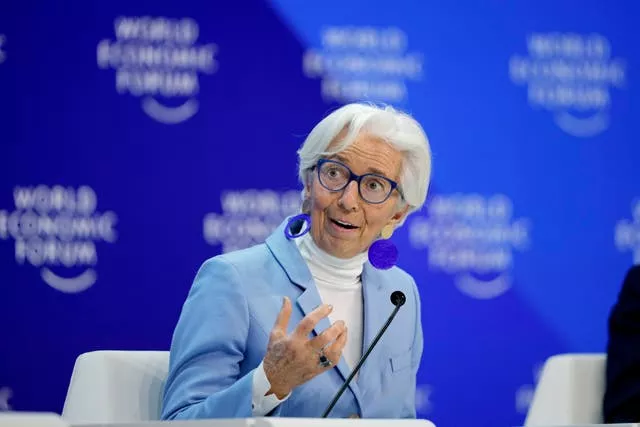The European Central Bank (ECB) left its key interest rate untouched at a record high on Thursday, keeping credit expensive for businesses and consumers as it tries to make sure inflation is firmly under control before cutting borrowing costs — a move that is expected later this year.
The question is, how much later?
Financial markets are expecting a rate cut from 4% as early as April, but ECB President Christine Lagarde said she and other bank officials agreed it was “premature to discuss rate cuts”.
At a news conference, she reiterated her stance that the bank would make decisions based on the latest figures about the economy’s health rather than offering a longer-term timetable for rate moves.

She said inflation has declined — reaching 2.9% in December after peaking at 10.6% in October 2022 — and it was expected to keep easing this year en route to the bank’s goal of 2%.
Ms Lagarde cautioned, however, that disruption from the Israel-Hamas war, including related attacks on ships in the Red Sea by Yemen’s Houthi rebels, could disrupt that progress.
Risks for higher inflation “include the heightened geopolitical tensions, especially in the Middle East, which could push energy prices and freight costs higher in the near term and hamper global trade,” she said.
With inflation falling in major economies, financial markets are frothing in hopes of cheaper credit that would boost business activity and stock prices.
Stock investors saw their holdings, such as those in US retirement accounts, soar in the last weeks of 2023 as the US Federal Reserve and ECB indicated that a rapid series of rate hikes was ending.
Federal Reserve chairman Jerome Powell said officials discussed prospects for rate cuts at the bank’s December meeting, and the US central bank has indicated that it would cut its key interest rate three times this year.
The S&P 500, a broad measure of US large company shares, has hit record highs this week, and European indexes also have risen.
We kept our interest rates unchanged at our latest meeting.
See our monetary policy decisions https://t.co/bEgIDpKhYv pic.twitter.com/zjqbHpHgS3— European Central Bank (@ecb) January 25, 2024
The global stock rally faces questions about whether gains can continue.
Rate cuts make riskier investments like stocks more attractive than safer bets like money market accounts and certificates of deposit.
They also stimulate business activity and thus prospects for share prices to go higher.
Like the ECB, Norway’s central bank kept rates steady Thursday.
The same day, the central bank in Turkey, which is suffering from out-of-control inflation of nearly 65%, raised its key rate to 45%, expected to be the last increase for some time.
Europe has seen inflation drop rapidly, with the ECB raising its key rate from negative levels — which made it cheap to borrow money to buy a house or invest in a business — to a record-high 4% in a little over a year.
While rate hikes are a central bank’s chief weapon to snuff out inflation, they also can slow the economy, which has been seen in Europe and countries around the world, feeding expectations for cuts now that inflation has dropped closer to preferred levels.

The economy of the 20 European Union member countries that share the euro currency, where the ECB sets interest rates, shrank slightly in the July-to-September quarter of last year. Expectations are no better for the following months.
The economic squeeze follows a surge of inflation fuelled by a supply chain crunch during the Covid-19 pandemic and then higher food and energy prices tied to Russia’s war in Ukraine.
The worst of the energy costs and supply problems have eased but inflation has spread through the economy as workers push for higher wages to keep up with the boost in prices they’re paying.
Analysts say there are good reasons for the ECB to move cautiously. For one, having to reverse course and raise rates if inflation does not keep falling — or spikes again — would only prolong the pain from tighter credit.
Another is the speed of pay raises for Europe’s workers.
ECB officials have indicated that they want to see figures for wage increases for the first months of this year before deciding where they think inflation is headed.
Ms Lagarde said: “We need to be further along in the disinflation process before we can be sufficiently confident that inflation will actually hit the target in a timely manner.”







